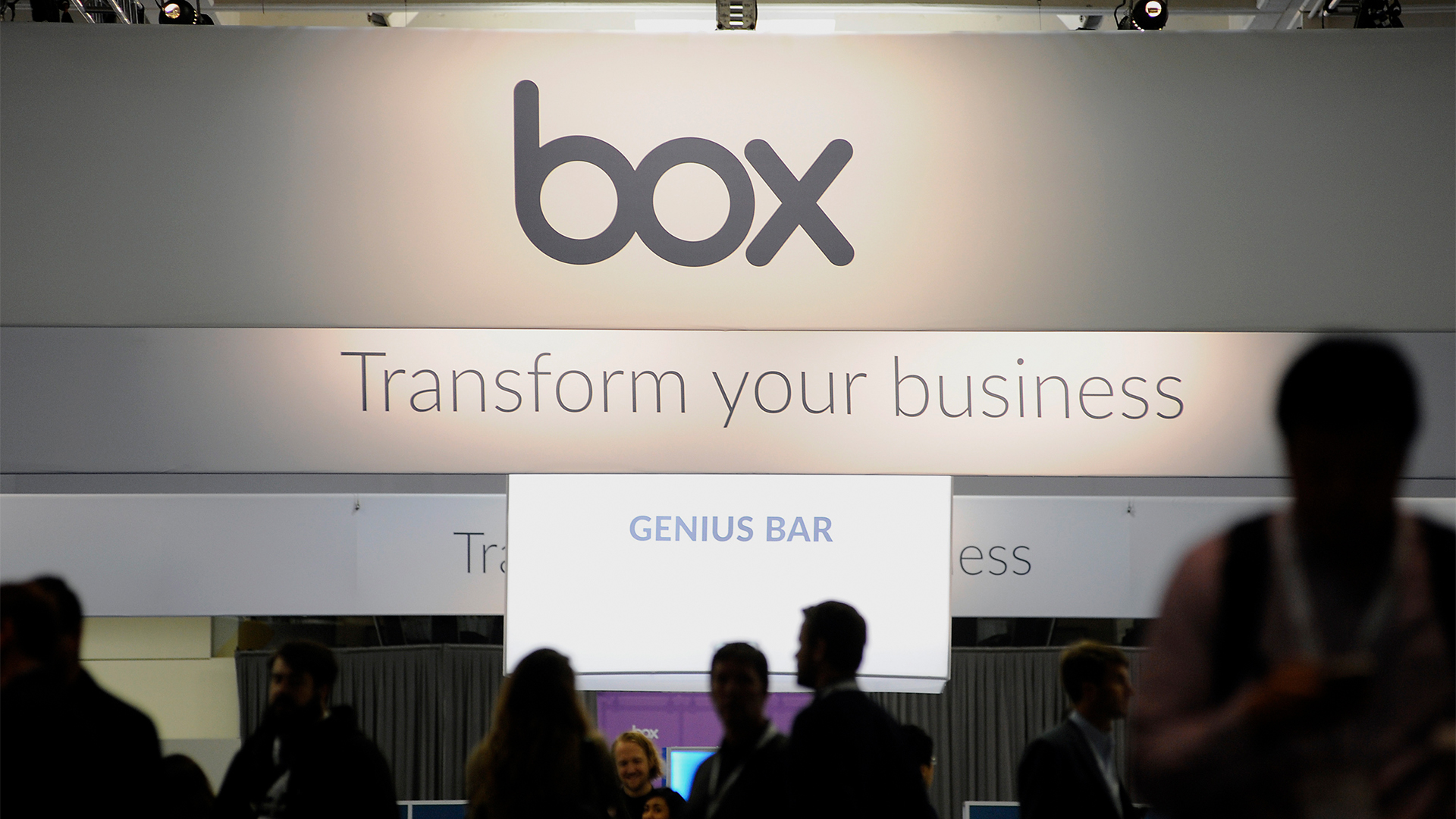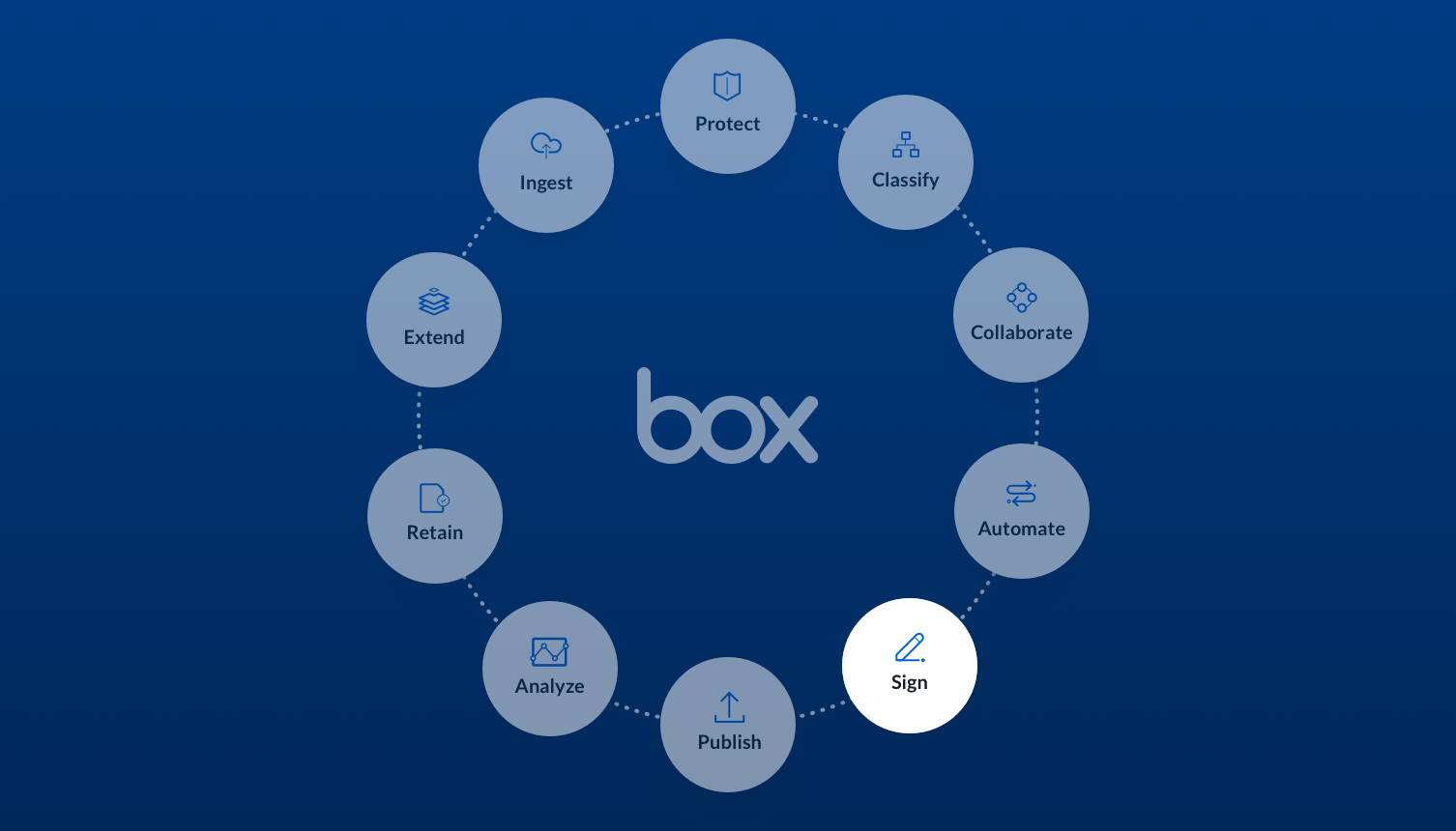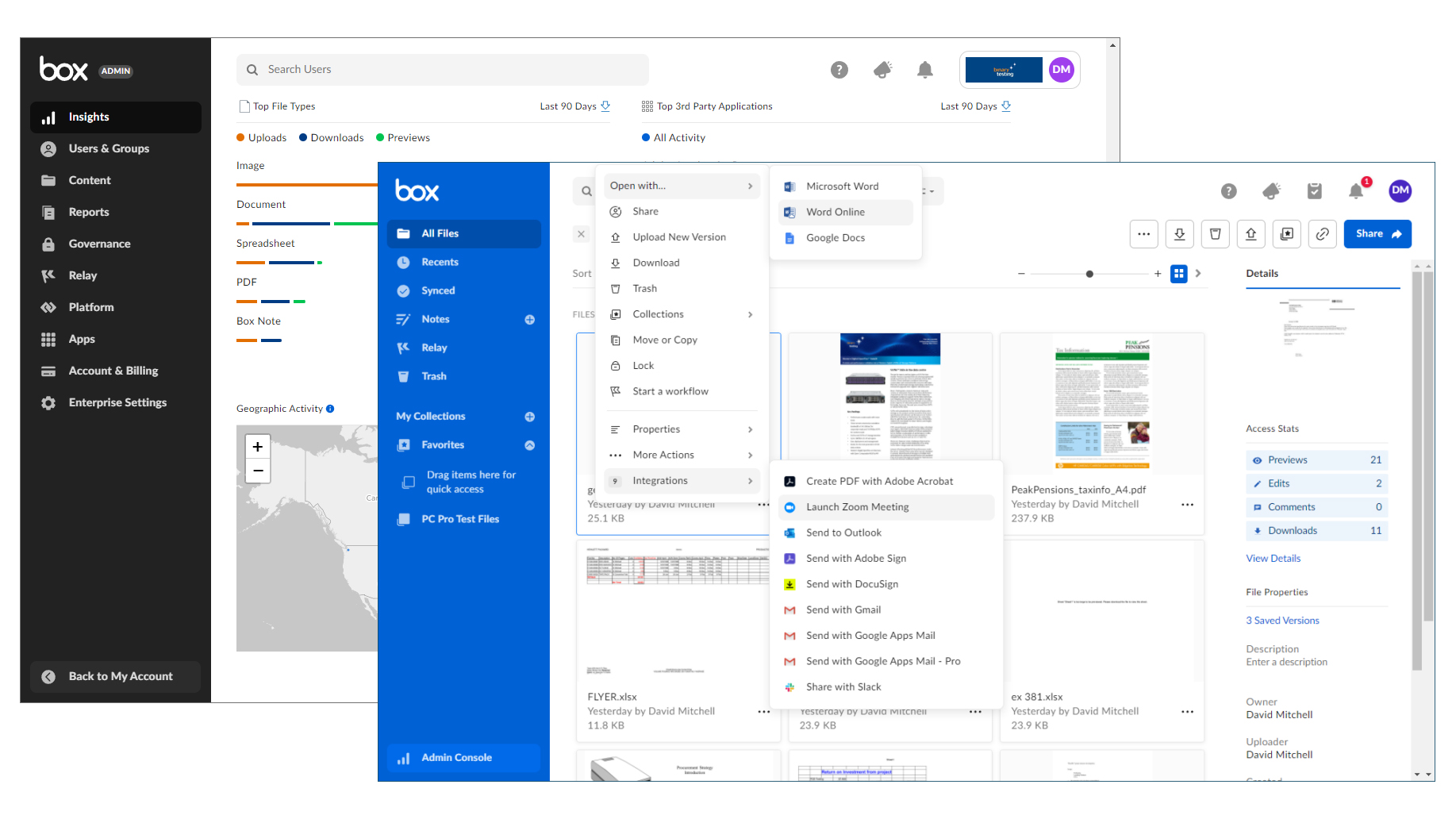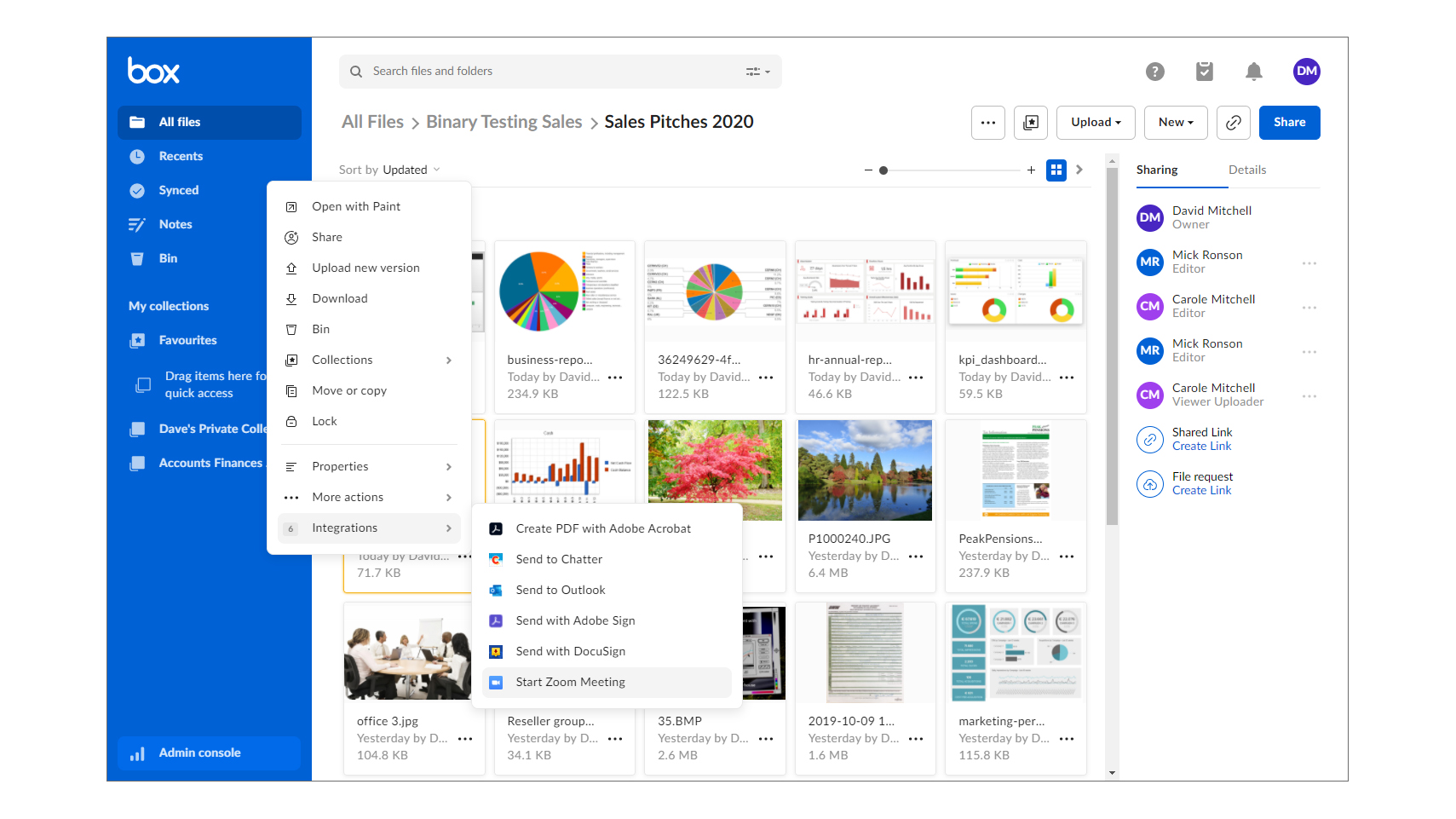Best cloud storage: Google One is now rolling out to US customers
There are a number of cloud storage services - but which offers best value?


Cloud storage news
07/09/2018: Dropbox Paper adds more preview support
Dropbox Paper now boasts additional preview support for three new tools, which the cloud storage firm says will help prevent users from getting lost in a sea of browser tabs.
The cloud storage giant explained in a blog post that users can now add Dropbox folders, Airtable and Lucidchart elements into their Paper documents and get instant content previews.
When pasting links to Dropbox folders, users will be able to see all the files stored inside it – as well as being able to navigate through its sub-folders straight from a Paper document. Should the documents inside the folder change, the preview will also update to reflect its new contents.
There’s also new support for Airtables in Paper, meaning users can simply add a base’s embed code in order to generate a preview in the view of preference – such as main, in progress, Kanban, gallery, form, or calendar. Similarly, new preview support for Lucidchart diagrams means that any Lucidchart publish links inserted in a Paper document will also automatically generate a preview without having to open the chart completely.
Dropbox Paper users can utilise the new additions now – simply insert a Dropbox folder, Airtable base or Lucidchart diagram into a document to get started.
ChannelPro Newsletter
Stay up to date with the latest Channel industry news and analysis with our twice-weekly newsletter
29/08/2018: Google One is now rolling out to US customers
Google has now launched its new Google One service in the US, with the rebrand bringing new, affordable pricing options to customers wanting to store their data in the cloud.
The service offers greater flexibility for users compared to Google Drive, with new price plans starting at $1.99 per month for 100GB of storage space. There’s also a $2.99 per month plan for 200GB of storage space, whilst those currently paying $9.99 per month will now have up to 2TB rather than the 1TB offered upon signup.
For customers that require larger storage capacity, Google is also offering a 10TB service for $100/month, 20TB for $200/month, as well as a 30TB plan for $300/month.
"Google One gives you more storage across Drive, Gmail, and Photos," Google explained in a blog post. "With plenty of space, your most important memories and files are stored safely in the cloud and available on all your devices. We've improved the price of some of our plans and added new plan options, so you can find one that works for you."
On top of new cloud storage tiers, Google One also delivers a variety of additional services – including a new Family Sharing feature that allows users to share their storage with up to five family members. There’s also instant access to 24/7 support, too, meaning no long waits to resolve account issues.
US customers can upgrade to Google One now – although no rollout date has been revealed for international users.
28/06/2018: Google's Cloud Filestore offers high-performance storage for the enterprise
Google has announced the arrival of Cloud Filestore - a new, fully managed file storage solution that provides high-performance storage for applications requiring a traditional filesystem interface.
Due for beta release next month, the service offers a simple network attached storage (NAS) experience in the cloud with fine-tuning options - which Google says will deliver "predictably fast performance for your file-based workloads".
"Cloud Filestore offers low latency for file operations," Google says. "For workloads that are latency sensitive, like content management systems, databases, random i/o, or other metadata intensive applications, Filestore provides high IOPS with minimal variability in performance."
Filestore also offers personal control over the IOPS and the required storage capacity, providing both flexibility and the ability to tailor the filesystem to your specific workload. Google also promises that performance for your customised workloads will remain consistent over time.
It's fully integrated with the wider Google Cloud, too, providing fluent communication with Google's cloud VMs and the Kubernetes Engine.
There's no full release date for Filestore yet - but Google has revealed that the service will come in both premium and standard tiers, priced at $0.30 per GB/month and $0.20 per GB/month respectively.
To register for the Cloud Filestore beta, simply enter your email address at Google's signup page.
15/05/2018: Ryanair to swap Microsoft for AWS cloud
Budget airline Ryanair is to ditch its data centres and shift its infrastructure to Amazon Web Services (AWS), the firm has announced.
As reported by our sister website IT Pro, the low-cost firm does currently use the Amazon cloud for sections of its business - such as its website Ryanair.com and Ryanair Rooms - but will now shift the rest of its data into it over the next three years.
Ryanair also plans to build a data lake on Amazon's S3 service that will leverage Amazon Kinesis to gain insights from both customers and its wider business. The company will also ditch Microsoft SQL Server, instead switching to Amazon Aurora for its European email marketing campaigns.
"We've chosen to work with the world's leading cloud to develop and deliver services that will transform our customers' travel experiences," said Ryanair CTO, John Hurley. "By rebuilding core applications, converting data into actionable insights, and creating intelligent applications, we are putting the solutions in place to continue our leadership in the travel industry."
On top those changes, Ryanair will also work with AWS's ML Solutions Lab to create an application that detects surges in demand for certain flights and predicts changes to flight schedules.
"Ryanair will be able to employ [our] services to drive greater customer and employee satisfaction," said Mike Clayville, vice-president of worldwide commercial sales at AWS. "We're excited to help them create first-class experiences on AWS as they continue to use our capabilities and services at an accelerated pace."
16/03/2018: Microsoft to open new cloud data centres in Europe and the Middle East
Microsoft is expanding its number of cloud storage data centres, the company has announced, with additional locations set to open in Switzerland, Germany and the United Arab Emirates.
Announcing the news in a blog post, the Redmond firm said its Azure service now offers more regions than any other cloud provider, having more than doubled its number of locations in the last three years.
"By delivering the comprehensive, intelligent Microsoft Cloud - comprising Azure, Office 365 and Dynamics 365 - from datacenters in a given geography, we offer scalable, available and resilient cloud services for companies and organizations while meeting data residency, security and compliance needs," Jason Zander, corporate vice president at Microsoft Azure, explained.
The new UAE data centres, which will be located in Abu Dhabi and Dubai, represent the company's first cloud storage foray into the Middle East, while locations in Zurich and Geneva make the Redmond giant the first cloud storage operator to introduce a cloud region to Switzerland.
Elsewhere, new cloud storage expansions in Germany will "compliment the options currently available for customers today", Microsoft said, with the additions providing enterprise-grade reliability and performance.
The firm also announced the opening of regions in France for its Azure and Office 365 services, with existing Office 365 customers now able to opt-in to have their data moved to local cloud regions.
12/03/2018: Dropbox partners with Google for Gmail, Docs and Hangouts integration
Dropbox has teamed up with Google Cloud to bring Gmail, Google Docs and Hangouts integration to its cloud storage service, the company has announced.
Revealing the move in a blog post, Dropbox said the initiative aims to deliver a "unified home for work" that streamlines projects and the way users collaborate. Available later this year, the features will allow users to create, edit, open, save and share Google Docs, Sheets and Slides straight from Dropbox - while document management will function just like
any other content, the cloud storage firm explained.
The additional Google Hangouts and Gmail integration also promises to improve communication with collaborators and colleagues, Dropbox said, with the features allowing users to select files from their Dropbox account and send links straight from Gmail and Hangouts.
"Our goal is to make G Suite accessible no matter what tools you bring to work, and these integrations help our shared customers better collaborate in the tools they use every day," said Ritcha Ranjan, director of project management at Google Cloud. "Working with Dropbox to make our apps work better together helps our customers focus their time on work that matters."
Dropbox previously introduced a similar Microsoft Office integration, allowing users to open, edit and save Dropbox-stored files from within Microsoft's productivity suite.
23/02/2018: Microsoft targets users of rival cloud storage services
Microsoft is offering its OneDrive services free of charge in a bid to convert users of rival cloud storage platforms Google Drive, Dropbox and Box.
Announcing the move in a blog post, the Redmond giant said that those using its competitors' services can switch to OneDrive for Business and not have to pay anything until their existing subscription expires.
Microsoft's offer runs until 30 June and is only open to those not already subscribed to OneDrive for Business or Office 365. Organisations must also transfer 500 or more users to the service, the company said.
Ron Markezich, an Office 365 corporate vice president, also revealed that 350,000 businesses are now using Microsoft's OneDrive services following a period of "amazing" growth. Last year alone, storage and file-syncing figures tripled for both small and large organisations, he claimed.
A key appealing factor has been OneDrive's innovations, Markezich added, with more than 100 new features having been added over the past year. These have included secure external file-sharing for those without a Microsoft account, OneDrive Files on Demand, multi-geo capabilities, Apple Files integration and more.
Those wanting to make the switch can do so over at the Microsoft website.
Which cloud storage is best for you?
Cloud storage comes in many flavours, and the choice is only growing as more and more businesses harness the power of the cloud. But with such a wealth of options, it’s hard to know which one to go for. That’s why we’ve rounded up the best cloud storage providers, to help you decide which is right for you.
Amazon Cloud Drive
While Amazon Web Services has been a titan in the enterprise cloud market for some time, its personal offering has not seen the same success. That’s a shame, as it’s actually not a bad deal at all.
Amazon Cloud Drive offers 5GB of free cloud storage for every Amazon customer with a maximum file size of 2GB, and unlimited photo storage if you’re a Prime member. While this isn’t as expansive as the allowances granted by some of its competitors, it’s not the worst.
It’s also good value when it comes to additional space. If you’re finding yourself running out of room, you can up your allocation to 20GB for just £6 per year. The company offers tiered pricing options all the way up to 1TB of storage for £320 per year. These start to become less of a bargain the higher you go, however.
Amazon Cloud Drive is accessible via the web and through Android and iOS apps – no Windows Phone support though. Naturally, support is also baked into all of the company’s Fire devices.
One big benefit of opting for Amazon’s service is that it leverages the company’s high level of cloud expertise and proven track record of security and reliability. With that in mind, customers can be confident that their data is unlikely to be put at risk through negligence or inexperience.
Google Drive
A relative latecomer to the game, Google hasn’t dominated the cloud storage market in the way it has other areas. It’s slowly gaining ground, however, due to the fact that it’s built in to the hugely popular Android operating system by default. It’s also available on iOS and online.
The initial offering on the service’s free tier is a hefty 15GB, which is likely to see many consumers through. However, this is split between Google Photos and Gmail as well, so if you’re an intensive user of either application, you might find yourself running out quicker than you think.
Thankfully, tiered pricing offers the ability to expand your storage space; the only problem is the rather steep incline. From 15GB, the next option up is 100GB for $1.99 per month (annual and UK prices are both unavailable). It’s not particularly expensive, but a happy medium would have been welcome nevertheless.
For SMBs, or the truly data-hungry consumer, storage options also go all the way up to 30TB for £299.99. It’s also got extensive integration with Google’s other products, including Google Apps for Work, as well as the standard suite of Docs, Sheets and Slides.
Dropbox
At first glance, Dropbox’s 2GB cloud storage allowance appears a meagre offering – and even more
so when comparing the service against rivals such as Google Drive. It’s all part of the firm’s unique tactic to widen its userbase, however, with users able to expand their storage capacity by referring friends, family and colleagues to Dropbox (up to a maximum of 18GB.
Should you want more than the basic service, Dropbox naturally offers a variety of premium
packages that provide much larger allowances and extra perks.
For business teams, Dropbox’s Standard package serves up 2TB of storage for £10 per user/month,
whilst the Advanced tier offers “as much space as needed” for £18 per user/month. Both tiers offer an array of tools and services, such as anywhere access, Smart Sync, extensive collaboration and productivity tools, as well as Dropbox’s advanced data protection perks.
Dropbox’s Enterprise tier takes it up another gear still, essentially scaling its cloud storage service to meet the needs of larger businesses. This tailored service means you’ll have to contact Dropbox for pricing, but the plan offers the firm’s full range of tools and functions – including enhanced deployment tools, additional device security, APIs for integration with IT systems, as well as dedicated support 24 hours a day.
Box
Although Box’s offering is unabashedly focused on enterprise usage, that doesn’t mean it hasn’t got a robust platform for personal cloud storage. Its basic tier, for example, has a sizable 10GB maximum allowance, with the catch that there’s a 250MB limit on uploading individual files.
The Personal Pro package raises this upload limit to 5GB, with a 100GB total storage cap to match. It’s a little steep, however, at £7 per month – a considerable amount more than most of its rivals.
Business users have considerably more choice. Box’s Starter pack for businesses costs just £3.50 per month, and comes complete with a 100GB maximum allocation, enhanced sharing tools, encryption and a 2GB file transfer limit.
The next tier up, Box for Business, offers unlimited storage, a 5GB file cap and enterprise mobility management capabilities for £11 per user per month. Box Enterprise is the big kahuna, however, and offers all the features of lower tiers as well as much more in-depth controls over how your data is stored, accessed and used. Due to the highly specialised nature of Box Enterprise deployments, pricing is agreed on a case-by-case basis.
OneDrive
Microsoft has also leveraged its not-insubstantial infrastructure power to provide personal cloud storage for its users. OneDrive customers are given 15GB of storage for free, with further allocations priced at £1.99 per month for an extra 100GB, and £3.99 per month for an extra 200 GB. It’s also got a full suite of mobile applications – including being one of the relative few that supports Windows Mobile.
Unsurprisingly though, where Microsoft’s cloud offering really shines is in its integrations with the rest of the company’s software. As part of the Office 365 platform, each user on a subscription receives 1TB of space free. OneDrive accounts also interface excellently with the other products in the Office range, with sharing and syncing option built directly into the software.
The company also provides a professional version, in the form of OneDrive for Business. As incentives to adopt its cloud platform over other, Microsoft touts its security credentials, as well as the in-app integrations with Office 365 software, allowing real-time collaboration between co-workers.
Verdict
There’s no one-size-fits-all answer when it comes to the cloud. The nature of your data needs defines which cloud storage provider is going to be best for you. With that said, however, we’d recommend Google Drive for basic personal use, as its large allowance and strong integration with the rest of Google’s software make it an easy option for the uninitiated.
For enterprise users, Box remains the best choice. Its three-tier business portfolio provides a range of choices at different price-points, all of which are geared around implementing cloud storage within an enterprise IT framework.
Dan is a freelance writer and regular contributor to ChannelPro, covering the latest news stories across the IT, technology, and channel landscapes. Topics regularly cover cloud technologies, cyber security, software and operating system guides, and the latest mergers and acquisitions.
A journalism graduate from Leeds Beckett University, he combines a passion for the written word with a keen interest in the latest technology and its influence in an increasingly connected world.
He started writing for ChannelPro back in 2016, focusing on a mixture of news and technology guides, before becoming a regular contributor to ITPro. Elsewhere, he has previously written news and features across a range of other topics, including sport, music, and general news.
-
 Criminals target APIs as web attacks skyrocket globally
Criminals target APIs as web attacks skyrocket globallyNews More than a third of web attacks target APIs as AI expands attack surfaces and brings new security challenges
By Emma Woollacott
-
 What to look out for at RSAC Conference 2025
What to look out for at RSAC Conference 2025Analysis Convincing attendees that AI can revolutionize security will be the first point of order at next week’s RSA Conference – but traditional threats will be a constant undercurrent
By Rory Bathgate
-
 Box lifts user query cap for Box AI, announces upcoming GPT-4o integration
Box lifts user query cap for Box AI, announces upcoming GPT-4o integrationNews Customers on Box’s Enterprise Plus plan are no longer restricted to 20 queries per month
By Daniel Todd
-
 Box launches free e-signature tool for all customers
Box launches free e-signature tool for all customersNews Embedded 'Box Sign' service comes from the firm's acquisition of SignRequest earlier in the year
By Bobby Hellard
-

 Box Business Plus review: Cloud storage that’s very hard to beat
Box Business Plus review: Cloud storage that’s very hard to beatReviews Simple, affordable file sharing with great collaboration tools and a superb range of third-party app integrations
By Dave Mitchell
-

 Box Business review: A terrific package
Box Business review: A terrific packageReviews A great all-round service, with powerful collaboration tools and unlimited storage for a good price
By Dave Mitchell
-
 Box opens new Silicon Roundabout headquarters
Box opens new Silicon Roundabout headquartersNews The building will serve as the company's European base
By Adam Shepherd
-
 Box revenues grow 26%, despite shareholder worry
Box revenues grow 26%, despite shareholder worryNews The company is hoping to hit $506 million in revenues next year
By Clare Hopping